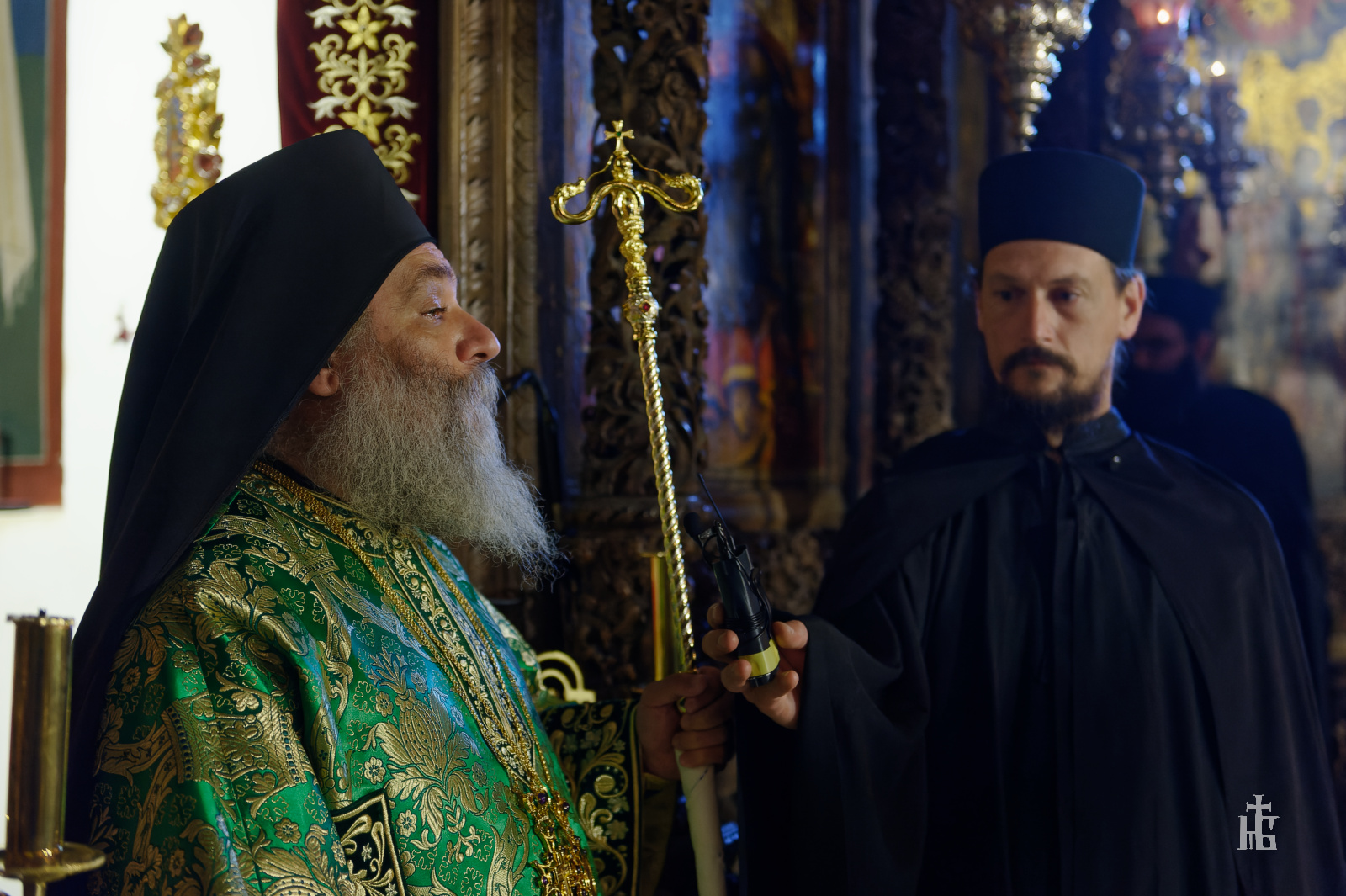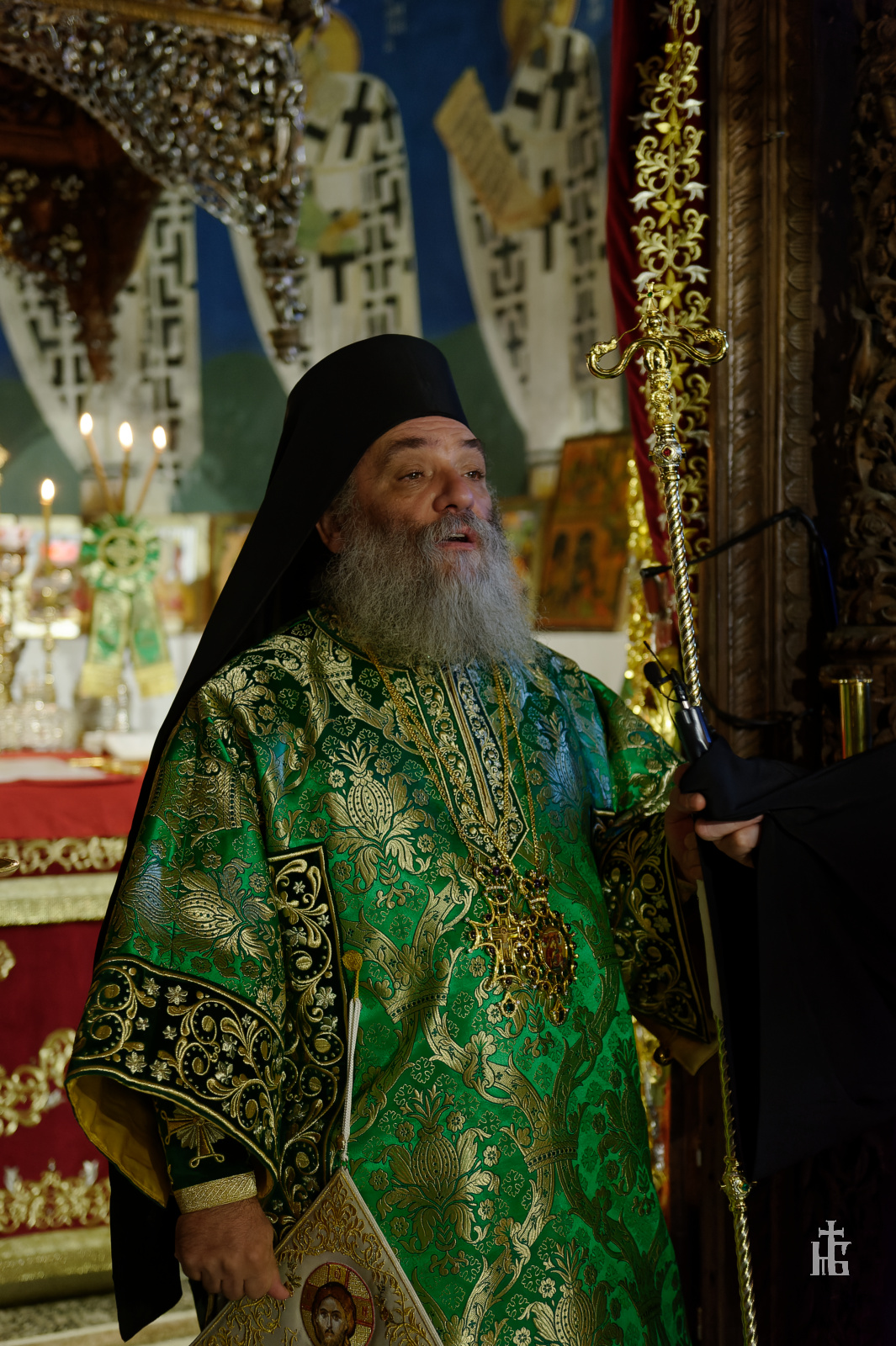Sermon of His Eminence, bishop Parthenius of Antania, Abbot of the Holy Bigorski Monastery, delivered on the day of St. John the Theologian
In the Name of the Father, the Son, and the Holy Spirit!
Beloved, today we are gathered together in love and festal joy by the one Divine Love, the “son of thunder” (Mark 3:17), and the holy and glorious Apostle and Evangelist John the Theologian. This beloved disciple and evangelist of Christ is known in particular as the Apostle of Love, because he was obedient and faithful to his Teacher to the very end.
In fact, faithfulness and obedience were the main signs, both soteriologically and didactically, by which the Son of God comes to Earth. He appeared as a man in this world in unfailing obedience to His Father, right up to His own bodily death. He abased Himself in taking on the form of a servant, making Himself equal to mankind and showing forth Himself as a man. He abased Himself to the point of His own death, even the death of the Cross (Philippians 2:7-8). In this way, He teaches us all that, as His disciples, we must be humble and obedient.

In today’s Gospel reading for the second Sunday after the Feast of the Exaltation of the Cross, we hear a very beautiful and useful teaching on obedience. The Lord Christ commands Apostle Peter to take his boat out onto the sea again, and to cast his fishing nets. This He commanded after the Apostle had spent all night trying to catch fish, but without any success, since the weather wasn’t good for fishing. Now, the Apostle was a fisherman, that was how he made his living, and so he told Christ about what had happened, saying: “Teacher, we were out fishing all night, and we didn’t catch anything.” However, he didn’t stop there, but rather out of respect for his Teacher, he immediately added, “But, I will cast out my nets, according to Thy Will.” You see, the Apostle knew that because of the weather, it wasn’t possible to catch any fish, but out of obedience he did what his Teacher had commanded him anyways. And then we hear in the Holy Gospel that he caught so many fish that his nets broke (Luke 5:4-6). A real miracle happened! His obedience brought him a great blessing. The Lord, Who is Omniscient, knew full well that the weather wasn’t right for fishing, but He foresaw that the Apostle would be obedient to Him and that it would become a blessing, a lesson, and an example for all.
Essentially, everything that God did while He was in bodily form on Earth was for our salvation and edification. He desired to show us that the most important thing in life is for man to walk always according to the Will of God. The Divine Will will be his guide when he is obedient to God’s commandments. If we want to understand what obedience is, we should first of all look at a few examples of disobedience. In fact, evil came forth into the world when the most radiant angel of all became envious of God the Creator, and fell from the Divine Light. Darkness and Hades were the results, and he brought down many angels into the abyss of hell along with him. A similar thing occurred with our forebearers, Adam and Eve. They were given but one commandment, one obedience: not to eat of the fruit of just one tree in the Garden of Eden. And yet, they transgressed this commandment and were disobedient. With their disobedience, evil and death were introduced to mankind. Israel, the Chosen People, suffered greatly due to their disobedience to God, and always experienced great misery as a result. On the other hand, the Son of Man, during His sojourn on Earth, showed us by His example how salvific, grace-filled, and blessed obedience is, and what great blessing it brings to us. Through obedience, He fulfilled God’s plan of salvation for the world and eternal life.
This means that where there is no obedience, there can be no blessing. Anarchy reigns in such a place, chaos and darkness rule. Such a calamitous situation can also occur even in the Church if there is no true obedience. Without obedience, chaos results in our families, in the company where we work, in society, and in the State. If people would follow after Christ’s example, and were obedient to one another in all good things, then we would have harmony in every aspect of life. The Apostle Paul tells us, “Children, obey your parents in the Lord, for this is right…And you, servants, be obedient to those who are your masters according to the flesh, with fear and trembling, in sincerity of heart, as to Christ” (Ephesians 6:1,5), “Who, though He was a Son, yet He learned obedience by the things which He suffered, and having been perfected, He became the author of eternal salvation to all who obey Him” (Hebrews 5:8). And here today, we hear in the Gospel that when we are obedient, God is ready to bless us, to do miracles for us, to do what is impossible for men. Humble obedience attracts God’s blessing and works miracles. We know this especially well in monasticism. In monasteries, all grace is acquired through the sacrifice and obedience of the monastics who left behind this world and exert themselves to fulfill the Will of God, which is expressed through obedience to their Elder. This is why God so often works miracles in monasteries.
Obedience is a divine virtue, though not just any obedience, but only that which is true and for the sake of God and which is done in God. At the vigil last night, we read in St. John the Theologian’s epistle that he advises Christians to examine all things with discernment: “Beloved, do not believe every spirit, but test the spirits, whether they are of God, because many false prophets have gone out into the world” (1 John 4:1). Obedience, then, is both salvific and necessary, but at the same time, we must be careful about whom we obey. When we choose a spiritual father, we should be very careful about to whom we entrust our soul, and to whom we will give our obedience. First of all, we should ask ourselves whether the man we are considering as a spiritual father has his own life in order, and if he lives in obedience. Does he go to confession? Are his teachings of sound mind and in accordance with the spirit of Church Tradition? Or, does he sow discord, gossip, and judgment? If a spiritual father tells you as a Christian that you should cast judgment on another spiritual father, or on other people in general, run away! Or if I were to tell my own spiritual children to think, speak, or write against another spiritual father, I would hope that they would abandon me! This is what St. John the Theologian teaches us: After we have tested the spirits, we should hold fast to what is healthy, what is right, what is tested, and stay away from whatever is not in accord with the Church’s teachings.

And so, before deciding which spiritual father we will obey, we should carefully examine his life. Oftentimes, when I am counseling the faithful, I compare choosing a spiritual father to choosing a doctor for bodily illnesses. When people are going to go see a doctor, first they look at whom they are going to, and to whom they are entrusting their bodily health. When choosing their family doctor, they research his professional record, they see what his reputation is like, and all the more when people need surgery, they do research to see which specialist is best. This is the kind of care and attention that we should have when choosing a spiritual father. Unfortunately, there are people in the Church who teach that we always have to choose our parish priest as our spiritual father. However, we find no such rule either in the church canons, or in the teachings of the Holy Fathers. Of course, we should always show respect to our parish priest and listen to him, since he prays for us and works for the benefit of our souls. But, everyone should choose a spiritual father according to his own heart, according to how we are taught by the Holy Fathers, wherever he may be. The Church is One, Holy, Catholic, and Apostolic. Thus, if someone finds a spiritual father who is in a different jurisdiction, nothing prevents them from going to confession with him. And as for the spiritual father, above all, he must be humble and obedient to the Church. He should live under spiritual guidance himself as well, not judge, not slander, and he should lead his spiritual children on the path of love. Thus, as we heard from the Apostle of Love at Vespers last night, “If someone says, ‘I love God,’ and hates his brother, he is a liar; for he who does not love his brother whom he has seen, how can he love God Whom he has not seen? And this commandment we have from Him: that he who loves God must love his brother also” (1 John 4:20-21).
This means that it is by love alone that we can be recognized as Christ’s and that it is through love alone that God will work through us. Apostle John is called “Theologian” because he loved the Lord Christ with all his strength and with complete confidence. At the Mystical Supper, he rested his head on the Lord’s chest, and from there, from the Love of Christ, he drew forth his wondrous, exalted theology. This is why it is said that his Gospel contains the deepest theological substance. We can see this even from the first words, “In the beginning was the Word, and the Word was with God, and the Word was God” (John 1:1). It begins from a great spiritual height, explaining to us that Christ was eternally together with the Father and the Son and the Holy Spirit, and that at the appointed time He came down and was incarnate on Earth for our salvation.
Beloved, today the Church presents us with two examples of Divine preachers, the zenith of the apostles, Saints Peter and John, that we might learn blessed obedience from them. This is Christ’s message of obedience, addressed to all of us. It is good and necessary that we all have the same trust in Christ’s words that the Apostle Peter had. With such faith, we will fulfill the entire Will of God. We often ask ourselves what God’s will is, and in fact, it is the voice of the Church, expressed through my spiritual father, through my priest, and through my bishop. This is God’s will. Do I obey? Then I do the will of the Heavenly Father.
May the Lord Christ give us the strength to be filled with love for Him and to venture deeper into the mysteries of God, which will fill our hearts with indescribable joy and illumination.
Amen!















